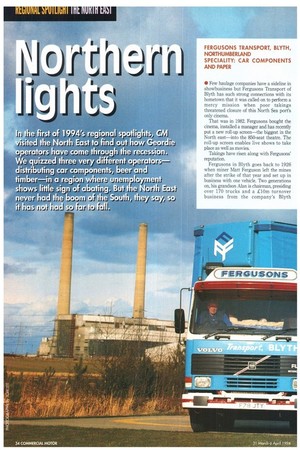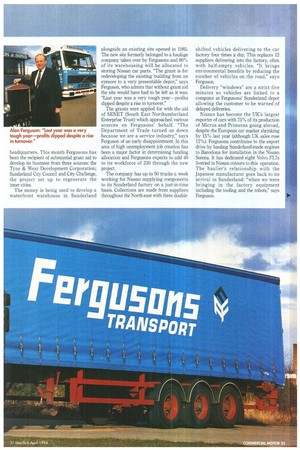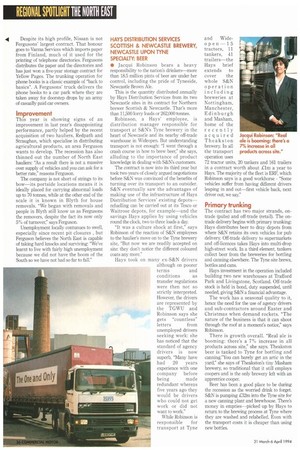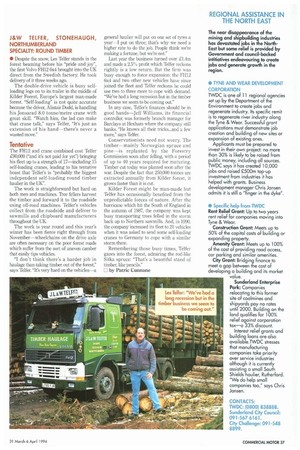• Few haulage companies have a sideline in showbusiness but
Page 38

Page 39

Page 40

Page 41

If you've noticed an error in this article please click here to report it so we can fix it.
Fergusons Transport of Blyth has such strong connections with its hometown that it was called on to perform a mercy mission when poor takings threatened closure of this North Sea port's only cinema.
That was in 1982. Fergusons bought the cinema, installed a manager and has recently put a new roll-up screen—the biggest in the North east—into the 850-seat theatre. The roll-up screen enables live shows to take place as well as movies.
Takings have risen along with Fergusons' reputation.
Fergusons in Blyth goes back to 1926 when miner Matt Ferguson left the mines after the strike of that year and set up in business with one vehicle. Two generations on, his grandson Alan is chairman, presiding over 170 trucks and a £10m turnover business from the company's Blyth headquarters. This month Fergusons has been the recipient of substantial grant aid to develop its business from three sources: the Tyne & Wear Development Corporation; Sunderland City Council and City Challenge, the project set up to regenerate the inner cities.
The money is being used to develop a waterfront warehouse in Sunderland alongside an existing site opened in 1985. The new site formerly belonged to a haulage company taken over by Fergusons and 80% of its warehousing will be allocated to storing Nissan car parts. "The grant is for redeveloping the existing building from an eyesore to a very presentable depot," says Ferguson, who admits that without grant aid the site would have had to be left as it was: 'last year was a very tough year—profits dipped despite a rise in turnover."
The grants were applied for with the aid of SENET (South East Northumberland Enterprise Trust) which approached various sources on Fergusons' behalf. "The Department of Trade turned us down because we are a service industry," says Ferguson of an early disappointment, In this area of high unemployment job creation has been a major factor in determining funding allocation and Fergusons expects to add 40 to its workforce of 230 through the new project.
The company has up to 50 trucks a week working for Nissan supplying components to its Sunderland factory on a just-in-time basis. Collections are made from suppliers throughout the North-east with three double
shifted vehicles delivering to the car factory four times a day. This replaces 12 suppliers delivering into the factory, often with half-empty vehicles. "It brings environmental benefits by reducing the number of vehicles on the road," says Ferguson.
Delivery "windows" are a strict five minutes so vehicles are linked to a computer at Fergusons' Sunderland depot allowing the customer to be warned of delayed deliveries.
Nissan has become the UK's largest exporter of cars with 75% of its production of Micras and Primeras going abroad, despite the European car market shrinking by 15% last year (although UK sales rose 12%). Fergusons contributes to the export drive by hauling Sunderland-made engines to Barcelona for installation in the Nissan Serena. It has dedicated eight Volvo FL7s liveried in Nissan colours to this operation. The haulier's relationship with the Japanese manufacturer goes back to its arrival in Sunderland: "when we were bringing in the factory equipment including the tooling and the robots," says Ferguson. Despite its high profile, Nissan is not Fergusons' largest contract_ That honour goes to Varma Services which imports paper from Finland, much of it used for the printing of telephone directories. Fergusons distributes the paper and the directories and has just won a five-year storage contract for Yellow Pages. The trunking operation for phone books is a classic example of "back to basics". A Fergusons' truck delivers the phone books to a car park where they are taken away for doorstep drops by an army of casually paid car owners.
Improvement This year is showing signs of an improvement in last year's disappointing performance, partly helped by the recent acquisition of two hauliers, Redpath and Straughan, which specialise in distributing agricultural products, an area Ferguson wants to develop. The recession has also thinned out the number of North East hauliers: "As a result there is not a massive over supply of vehicles and you can ask for a better rate," reasons Ferguson.
The company is not short of strings to its bow—its portside locations means it is ideally placed for carrying abnormal loads up to 70 tonnes, while at the other end of the scale it is known in Blyth for house removals. "We began with removals and people in Blyth still know us as Fergusons the removers, despite the fact its now only 5% of turnover," says Ferguson.
Unemployment locally contunues to swell, especially since recent pit closures , but Ferguson believes the North East is capable of taking hard knocks and surviving: "We've learnt to live with fairly high unemployment because we did not have the boom of the South so we have not had so far to fall." HAYS DISTRIBUTION SERVICES SCOTTISH & NEWCASTLE BREWERY, NEWCASTLE UPON TfNE SPECIALTY: BEER • Jacqui Robinson bears a heavy responsibility to the nation's drinkers more than 18.5 million pints of beer are under her control, including the pride of Tyneside, Newcastle Brown Ale.
This is the quantity distributed annually by Hays Distribution Services from its two Newcastle sites in its contract for Northern brewer Scottish & Newcastle. That's more than 11,500 lorry loads or 262,000 tonnes.
Robinson, a Hays' employee, is distribution manager responsible for transport at S&N's Tyne brewery in the heart of Newcastle and its nearby off-trade warehouse in Wideopen. But understanding transport is not enough: "I went through a crash course in how to brew beer," she says, alluding to the importance of product knowledge in dealing with S&N's customers.
The contract is now into its third year but took two years of closely argued negotiations before S&N was convinced of the benefits of turning over its transport to an outsider. S&N eventually saw the advantages of making use of the infrastructure of Hays Distribution Services' existing depots— refuelling can be carried out at its Tesco or Waitrose depots, for example—and the savings Hays applies by using vehicles round the clock, two to three loads a day.
"It was a culture shock at first," says Robinson of the reaction of S&N employees to the haulier's move on to the Tyne brewery site, "But now we are readily accepted on site: they don't notice the different coloured coats any more."
Hays took on many ex-S&N drivers although on poorer terms and conditions as transfer regulations were then not so strictly interpreted. However, the drivers are represented by the TGWU and Robinson says she gets "countless" letters from unemployed drivers seeking work: she has noticed that the standard of agency drivers is now superb, "Many have had 20 years experience with one company before being made redundant whereas five years ago they would be drivers who could not get work or did not want to work."
While Robinson is responsible for transport at Tyne and Wideopen—i5 tractors, 11 tankers, 41 trailers the Hays brief extends to cover the whole S&N operation including breweries at Nottingham, Manchester, Edinburgh and Masham, home of the recently acquired Theakston brewery. In all the transport operation uses 72 tractor units, 20 tankers and 161 trailers in a contract worth about Llm a year to Hays. The majority of the fleet is ERF, which Robinson says is a good workhorse "Some vehicles suffer from having different drivers leaping in and out—first vehicle back, next driver out, we say."
Jacqui Robinson: "Real ale is booming: there's a 7% increase in all products across site."
Primary trunking
The contract has two major strands, ontrade (pubs) and off-trade (retail). The ontrade delivery begins with primary trunking: Hays distributes beer to dray depots from where S&N retains its own vehicles for pub delivery Off-trade delivery to supermarkets and off-licences takes Hays into multi-drop high-street work. In a third element, tankers collect beer from the breweries for bottling and canning elsewhere. The Tyne site brews, bottles and cans.
Hays investment in the operation included building two new warehouses at Trafford Park and Livingstone, Scotland. Off•trade stock is held in bond, duty suspended, until needed, giving S&N a financial advantage.
The work has a seasonal quality to it, hence the need for the use of agency drivers and sub-contractors around Easter and Christmas when demand rockets. "The nature of the business is that it can shoot through the roof at a moment's notice," says Robinson.
There is growth overall. "Real ale is booming: there's a 7% increase in all products across site," she says. Theakston beer is tanked to Tyne for bottling and canning."You can barely get an attic in the yard," she says of Theakston's tiny Masham brewery, so traditional that it still employs coopers and is the only brewery left with an apprentice cooper.
Beer has been a good place to be during the recession as the worried drink to forget. S&N is pumping f32rri into the Tyne site for a new canning plant and brewhouse. There's money in empties—picked up by Hays to return to the brewing process at Tyne where they are washed and relabelled. Even with the transport costs it is cheaper than using new bottles. • Despite the snow, Les Telfer stands in the forest beaming before his "pride and joy", the first Volvo FH12 6x4 brought into the UK direct from the Swedish factory. He took delivery of it three weeks ago.
The double-drive vehicle is busy selfloading logs on to its trailer in the middle of Kilder Forest, Europe's largest man-made forest. "Self-loading" is not quite accurate because the driver, Alistair Dodd, is handling his Jonsarad 8.0 tonne/metre crane with great skill. "Watch him, the lad can make that crane talk," says Telfer, "It's just an extension of his hand—there's never a wasted move."
Tentative
The FH12 and crane combined cost Telfer £90,000 ("and it's not paid for yet") bringing his fleet up to a strength of 17 including 15 self-loading cranes, leading to his tentative boast that Teller's is "probably the biggest independent self-loading round timber haulier in the UK".
The work is straighforward but hard on both men and machines. Tree fellers harvest the timber and forward it to the roadside using off-road machines. Telfer's vehicles collect from the roadside and deliver to sawmills and chipboard manufacturers throughout the UK.
The work is year round and this year's winter has been fierce right through from Novernher—wheelchains on the drive axle are often necessary on the poor forest roads which suffer from the sort of uneven camber that easily tips vehicles.
"I don't think there's a harder job in haulage than taking timber out of the forest," says Teller. "It's very hard on the vehicles a general haulier will put on one set of tyres a year—I put on three; that's why we need a higher rate to do the job. People think we're making a fortune, but we're not."
Last year the business turned over £1.4m and made a 2.5% profit which Telfer reckons rightly is a low return. But the firm was busy enough to force expansion: the FH12 6x4 and two other new vehicles have since joined the fleet and Telfer reckons he could use two to three more to cope with demand. "We've had a long recession hut in the timber business we seem to be coming out."
In any case, Teller's finances should be in good hands Jeff Williams, its financial controller, was formerly branch manager for Barclays at Hexham where the company still banks. "He knows all their tricks...and a few more," says Telfer.
Conservationists need not worry. The timber—mainly Norwegian spruce and pine—is replanted by the Forestry Commission soon after felling, with a period of up to 40 years required for maturing. Timber cut today was planted soon after the war. Despite the fact that 250,000 tonnes are extracted annually from Kilder forest, it grows faster than it is cut.
Kilder Forest might be man-made but Teifer has occasionally benefited from the unpredictable forces of nature. After the hurricane which hit the South of England in the autumn of 1987, the company was kept busy transporting trees felled in the storm back up to Northern sawmills. And, in 1990, the company increased its fleet to 21 vehicles when it was asked to send some self-loading cranes to Germany to cope with a similar storm there.
Remembering those busy times, Teller gazes into the forest, admiring the rod-like Sitka spruce: "That's a beautiful stand of timber, like pencils."
III by Patric Cunnane






























































































